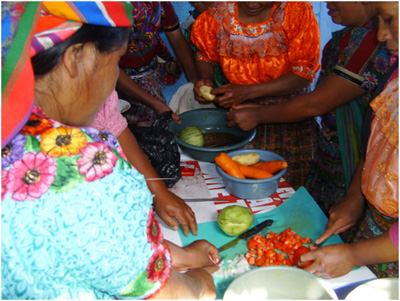By Ellen Alderton Some people realize early that they are called to service. Mayra Barcenas immigrated to the United States from rural Mexico as a child with her family. As a young person, she quickly came to some hard realizations: “Although we were living the American Dream, my family and friends were burdened by illnesses that heavily fell on poor and immigrant populations.” Truthfully, the outlook for many Latino families coming to this country can be bleak. Latino families often experience high rates of teen pregnancies, sexually transmitted diseases, obesity, substance abuse, truancy, and gang-related activities. Barcenas saw these challenges as a call to action. “As an undergraduate at the University of California, Irvine, I decided to pursue a career in public health with a focus on immigrant health, and I decided to join the Peace Corps to reinforce my graduate career and further experience why people immigrate to the United States.” Loma Linda University School of Public Health offered Barcenas a special opportunity to combine Peace Corps service with her graduate school trajectory. The School of Public Health belongs to a network of graduate schools across the country, called Master’s International, that partner with the Peace Corps. Master’s International students typically take a year of classes to prepare them for Peace Corps service, then serve 27 months overseas in a Peace Corps assignment related to their studies, before returning to complete any final requirements for their degree. Loma Linda University School of Public Health has participated in the Master’s International program since 1995. Barcenas, who graduates with a Master of Public Health this June says, “as a Master’s International student, I focused on train-the-trainer principles and worked closely with health promoters at the community level; I collaborated with a community-based organization to address public-health concerns affecting the Hispanic population.” Barcenas has since been able to reinforce this formal academic training at Loma Linda with her Peace Corps experience. In March 2011, Barcenas was placed in her Peace Corps assignment as a public health volunteer in El Quiche, Guatemala. She says, “as a Peace Corps Volunteer, I have continued working with health promoters as a way to address community needs. Although the health topics are different in Guatemala, I have applied the same principles of non-formal adult education that I used in my academic studies and have successfully implemented a Health Promoter Academy.”

Besides the career experience that serving in Guatemala has brought her, Barcenas has also found the Peace Corps personally rewarding. She says, “I have been blessed to serve in a gracious and loving country while fulfilling my degree’s practicum. As a Peace Corps Volunteer, I’ve experienced and lived the life of a Guatemalan. Friends and families have shared their stories and I have shared mine.” Barcenas will always have a special place in her heart for immigrants, and that includes people considering leaving their country behind. Realizing how dramatic and disorienting this process can be, she has counseled the people she serves in the Peace Corps that they also have other options. “Many (of the people I serve) have shared why they wish to leave their homes and risk immigrating to the United States: They simply seek improved living conditions. As a Master’s International student, I have been given the skills to help them help themselves and attain overall wellbeing for themselves and for their loved ones without having to leave their country.” Barcenas completes her Peace Corps service and returns to the United States in mid-June. Summing up the Master’s International experience, she says, “both my academic experience and my Peace Corps service have been closely intertwined and continue to shape my future career plans in public health.” Barcenas already has a job lined up with a nonprofit organization, El Sol Neighborhood Educational Center, where she will be helping Latinos in San Bernardino County. She continues to walk down the career path she has already established. “Master’s International has given me the tools necessary to address immigrant population health in the United States. With my degree in public health, I will continue training health promoters on disease prevention among Spanish-speaking communities. Using the skills I learned as a Master’s International student, I hope to address chronic illnesses that primarily affect low-income Hispanic populations.”
